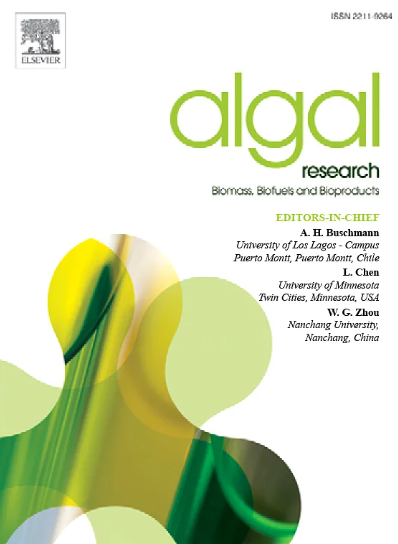海洋中占主导地位的 Synechococcus II 支系表现出应对热应力的非规范转录反应
IF 4.6
2区 生物学
Q1 BIOTECHNOLOGY & APPLIED MICROBIOLOGY
Algal Research-Biomass Biofuels and Bioproducts
Pub Date : 2025-01-01
DOI:10.1016/j.algal.2024.103840
引用次数: 0
摘要
本文章由计算机程序翻译,如有差异,请以英文原文为准。
The dominant marine Synechococcus clade II exhibits a non-canonical transcriptional response to cope with thermal stress
Temperature significantly impacts the growth and distribution of marine cyanobacteria, which employ diverse strategies to cope with temperature variations. However, the molecular mechanisms underlying thermal acclimation in cyanobacterial taxa that dominate vast oligotrophic regions of the ocean, such as the Synechococcus clade II, remain unknown. Here, we analysed the physiological and global transcriptional response of an ecologically relevant clade II strain (Synechococcus sp. RS9907) to long-term thermal acclimation at temperatures from 20 to 33 °C. The growth rate in RS9907 increased linearly with temperature up to the warm threshold (33 °C), but genes related with the heat-shock response were upregulated within the range of 28 to 33 °C, indicating significant cellular stress under warm conditions. Carbon fixation and assimilation genes (rcbLS, cbbA, zwf, glgP) showed minimum expression values at 20 °C and 33 °C, but the diel expression patterns of these genes remained unaffected by temperature conditions, being consistently upregulated during day-time. By contrast, some genes involved in photosynthesis (acpA, psbABO, psaABD) were strongly upregulated during night-time under warm conditions, suggesting regulatory imbalances during the diel cycle. Notably, the expression of genes related to the synthesis of osmolytes against salt stress and fatty acid desaturases, which are typically upregulated under cold temperature in other cyanobacteria, was induced in warm acclimated RS9907 cells. These results highlight distinct transcriptional mechanisms of thermal acclimation in members of the Synechococcus clade II compared to other cyanobacterial lineages. This emphasizes the importance of understanding the diverse and intricate ways in which marine cyanobacteria adapt to temperature fluctuations.
求助全文
通过发布文献求助,成功后即可免费获取论文全文。
去求助
来源期刊

Algal Research-Biomass Biofuels and Bioproducts
BIOTECHNOLOGY & APPLIED MICROBIOLOGY-
CiteScore
9.40
自引率
7.80%
发文量
332
期刊介绍:
Algal Research is an international phycology journal covering all areas of emerging technologies in algae biology, biomass production, cultivation, harvesting, extraction, bioproducts, biorefinery, engineering, and econometrics. Algae is defined to include cyanobacteria, microalgae, and protists and symbionts of interest in biotechnology. The journal publishes original research and reviews for the following scope: algal biology, including but not exclusive to: phylogeny, biodiversity, molecular traits, metabolic regulation, and genetic engineering, algal cultivation, e.g. phototrophic systems, heterotrophic systems, and mixotrophic systems, algal harvesting and extraction systems, biotechnology to convert algal biomass and components into biofuels and bioproducts, e.g., nutraceuticals, pharmaceuticals, animal feed, plastics, etc. algal products and their economic assessment
 求助内容:
求助内容: 应助结果提醒方式:
应助结果提醒方式:


